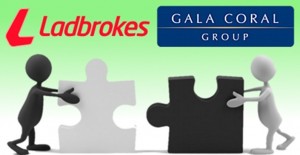Strange things are happening in the world of bookmakers at the moment. Sworn enemies are suddenly expressing a new found fondness for each other. It’s almost as if we have time travelled back to the 1960’s and are experiencing a new summer of love.
The news about the proposed merger between Coral and Ladbrokes comes soon after Paddy Power and Betfair overcame their regulatory hurdles and joined forces. The UK’s Competition and Markets Authority cleared the deal in December and the first shares in Paddy Power Betfair plc were listed for trading on the London Stock Exchange and Irish Stock Exchange on February 2nd 2016.
The £5 billion-plus merger between Betfair and Paddy Power was announced in August, with shareholders of both firms giving their approval in December. Paddy Power shareholders will own 52 per cent of the new business, with the remainder held by Betfair.
The merger between Coral and Ladbrokes is however likely to attract much more restrictions and attention due to the market share a deal between the two companies would obtain.
The UK’s competition regulator has already expressed concern and stated in its initial investigation that a merger would create a “substantial lessening of competition” within fixed odds betting on the high street. The regulator agreed to “fast track” its second part of the investigation, which will focus on the impact on local competition for sportsbook operators.
 Certainly not everyone is happy, many players fear that the merger between Coral and Ladbrokes will lead to an inferior betting bonus offer for new customers. Others think that existing bonuses will be drastically reduced due to the lack of competition within the industry. Some are questioning if the merger will mean less variance in the odds that are available both in shops and online.
Certainly not everyone is happy, many players fear that the merger between Coral and Ladbrokes will lead to an inferior betting bonus offer for new customers. Others think that existing bonuses will be drastically reduced due to the lack of competition within the industry. Some are questioning if the merger will mean less variance in the odds that are available both in shops and online.
Many of Ladbrokes shareholders are also not too enthusiastic about the potential marriage of two of the biggest names in betting. Dermot Desmond who is an International Investment and Underwriting Consultant and also a shareholder in Ladbrokes has launched a campaign “say no to Coral”. He has also written an impassioned letter to all Ladbrokes shareholders explaining why this merger is particularly bad for Ladbrokes.
Mr Desmond is particularly stinging in his assessment, “Ladbrokes has a great brand but, unlike Coral, has failed to migrate its customers online. Ladbrokes needs a new management team to achieve this. However, giving away half your company and taking on over £800m of debt is a very expensive way to recruit a quality management team.”
Mr Desmond also insinuates that the stock market is also against the merger with his comment, “Since the announcement on 24 July, the Ladbrokes share price has fallen 16% from 130p to 109p, wiping out a further c. £200m in shareholder value, indicating the market’s view on the proposed transaction. In contrast, since the announcement of the Paddy Power/Betfair merger, their share prices have increased 35% and 20% respectively.”
Some of the biggest winners out of this merger may well be direct competitors of Coral and Ladbrokes. Companies such as Betfred, Paddy Power and Boylesports will be rubbing their hand in glee if, as expected, the UK’s Competition and Markets Authority forces them to sell off between 400 and 1,000 betting shops. This sell off is likely to be below market price and when you consider that a quarter of Coral’s profits are realised from the highly controversial Fixed Odds Betting Terminals (FOBT) in their shops, this may just be the start of Coral and Ladbrokes’ problems, not the end of them!
